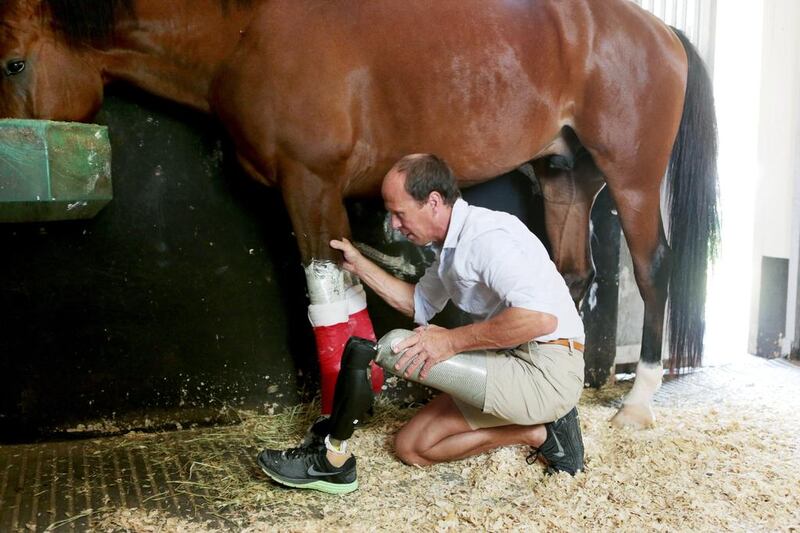Ernst Oertel will explore every avenue in a bid to clear his name after the Emirates Racing Authority (ERA) on Monday banned the dual champion trainer for four months.
Oertel intends to appeal his ban, which was effective immediately, and hopes to have a hearing in place by Monday.
He will continue to be banned during the appeal process.
The Equine Forensic Unit of Dubai found that Razeen and Mell De Piboul had traces of ibuprofen in their urine following runs at Sharjah on November 1 and Abu Dhabi on November 16.
A third horse in Oertel’s yard has subsequently been found to also have the anti-inflammatory drug in its system.
The two horses tested by the ERA were disqualified.
“I am innocent of administering this,” Oertel said. “I do not know where the ibuprofen has come from. We do not use it here at Al Asayl.
“I have been a strong supporter of the ERA’s anti-drug policy. I am frustrated as I know I have not done it.”
Even if Oertel can prove that both he and his staff are not the source of ibuprofen, he was the licence holder at Al Asayl, the Abu Dhabi-based operation, and therefore he carries responsibility for the horses in his care.
Oertel must leave Al Asayl, where he has been a resident for four years, until his ban expires on April 15. The stable will be presided over by Salim Al Ketbi, the managing director. Veronika Aske, the assistant trainer, will carry on in her role.
Before his ban, Oertel moved Razeen and Mell De Piboul to another stable, changed their water and feed and continued to test every horse in his stable before running.
On Saturday, Razeen was still showing traces of ibuprofen in urine tests but not in blood tests. Ibuprofen clears from a horse’s system within a week.
A third horse, El Mansour, who ran into last place on his season debut at Jebel Ali last month, has subsequently tested positive for ibuprofen at Al Asayl.
This is not the first time that a horse in Oertel’s care has been found to have been administered ibuprofen.
Devdas was disqualified from a race over 1,400 metres at Meydan on November 7.
The Central Veterinary Research Laboratory detected the substance and their findings were verified by the Singapore Turf Club. Oertel was fined Dh30,000.
In January, the ERA stewards and Equine Forensic Unit found furosemide in the post-race urine sample of Nymphea Du Paon, after the filly won the Arabian Triple Crown round one at Abu Dhabi on January 5.
Furosemide, otherwise known as Lasix, is a diuretic and anti-bleeding drug that possesses performance-enhancing qualities.
He was fined Dh60,000 for the presence of the drug in his charge and an extra Dh5,000 for failing to enter treatment given to the filly in her medication log book.
“The people here at Al Asayl are completely behind me,” Oertel said. “This has been a tough year for me. It has been like something out of a Dick Francis novel.”
ERA gets tough on banned substances
Over the past 18 months, the Emirates Racing Authority (ERA) has significantly increased the number and sophistication of its tests for prohibited substances.
Sheikh Mohammed bin Rashid, Vice President of the UAE and Ruler of Dubai, decreed in May last year that the use of anabolic steroids would be a criminal offence. Since then, testing has become far more frequent and regulated.
The ERA can also cast their net wider, following the implementation of non-race day testing.
Last season, the Equine Forensic Unit installed a Beckman DCX 600 machine for detecting carbon dioxide levels commonly associated with “milkshaking”.
It was much needed, with organisations, such as the Breeders’ Cup, having those processes in place for many years.
A milkshake is a white, frothy concoction of sodium bicarbonate and, usually, glucose, which is administered through a tube and helps slow the effects of lactic acid build-up. Lasix, a diuretic that reduces bleeding in horses, also has been shown to elevate carbon-dioxide levels.
Records indicate that during the 2009/10 season, the Emirates Racing Authority conducted 574 pre-race tests and 499 post-race tests.
Those checks resulted in one positive test.
Last season, 1,891 pre-race and 712 post-race tests were conducted. A further 225 non-raceday tests were conducted, in the first season such investigations were permitted.
Three horses under the care of trainer Ernst Oertel, Razeen and Mell De Piboul, as well as El Mansour, have been found to have ibuprofen in their systems.
Without El Mansour, who was tested unofficially at Oertel’s Al Asayl stable, 13 horses have tested positive in the past six seasons, with six since the start of last season.
sports@thenational.ae
Follow our sports coverage on Twitter @SprtNationalUAE





